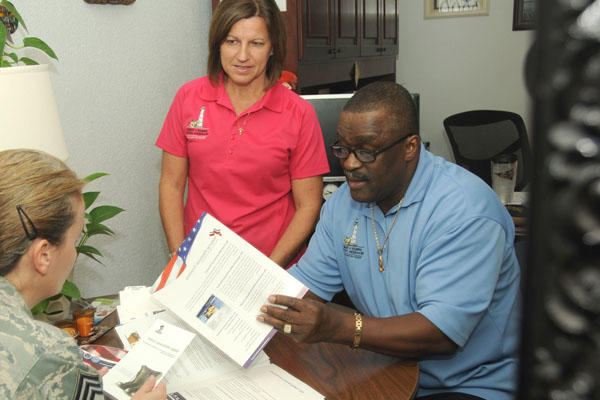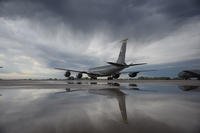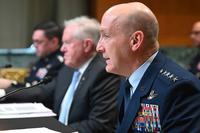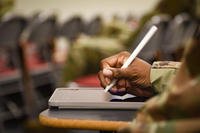Based on feedback from Airmen, the Transition Assistance Program is having a positive impact on preparing them for life outside of the military.
More than 230,000 people have attended transition workshops since 2012 when the TAP program was redesigned to better prepare Airmen for separation or retirement.
The program consists of a five-day Transition GPS (Goals, Plans, Success) Workshop which includes completion of a career readiness checklist and Department of Labor and Department of Veterans Affairs curricula. Optional higher education, entrepreneurial and vocational training tracks are also available to ensure Airmen have the training and skills needed to transition successfully into civilian life.
"Transitioning into civilian life can be a challenging process," said Brendon Lausch, AFPC Airman and Family Support Branch community readiness analyst. "But that doesn't have to be the case. TAP has evolved since its inception in 1991, and there are more tools than ever before to help Airmen achieve success in their civilian lives."
Jessica Woodruff, a retired Air Force health services management specialist, had heard many stories about service members who could not find a job after retirement. She admits to being very apprehensive about re-entering the civilian job market. Participating in TAP helped relieve some of her apprehension.
"I didn't even know where to start looking for a job until I attended the TAP workshop," said Woodruff. "After the one-week course, I not only had a shiny new resume, but I also had an idea of what I was worth in the civilian market and the best market for my career."
Woodruff settled in Alabama after retiring and within one month had a managerial position at a cancer center. She credits her success to the help and guidance she received from the TAP workshop and staff.
Many Air Force skills are easily transferable to the civilian world, but the art of translating military language and skills into terms a civilian employer understands can be challenging, said Lausch. That's where the Military Occupational Code Crosswalk training comes in. It's a two- to three-hour module offered during the five-day TAP workshop that helps Airmen translate their skills, training and experience into corresponding civilian job descriptions.
Nate Barnhart, a former aerospace ground equipment superintendent, learned how to take Air Force-unique acronyms and skill sets and target his resume to individual employers.
"TAP provided the foundation to formulate my job search," said Barnhart. "The insight from the human resources facilitators and information I received in training was invaluable. I sent out numerous resumes, tailoring them for each job and in about a month I had two job offers."
He is now manager of a multinational manufacturing plant.
During employment training, facilitators conduct role-playing and mock interviews to prepare Airmen for the job hunt.
"I found the mock interviews particularly helpful," said Scott Sitterson, a recently retired logistics readiness officer. "Even if a service member is unsure of their career path, there is still value in the exercise. I used the questions and interview techniques for my first interview and I got the job!"
Sitterson is now a financial adviser.
Although useful for Airmen as they prepare to retire or separate, TAP is no longer an end-of-career activity. The earlier an Airman plans his or her transition, the easier it will be. To fully prepare for transition, Lausch advises Airmen to participate in TAP early and often throughout their career - or what the Department of Defense refers to as the TAP "military life cycle." Airmen can participate in any module virtually any time in their military career. This introduces transition activities at the first duty station and at various touch-points throughout an Airman's career, such as promotion, relocation, marriage and family changes.
In addition to the five-day TAP workshop, there are three, two-day tracks, that transitioning personnel can participate in:
- Accessing Higher Education - geared toward individuals interested in pursuing education at an accredited academic institution;
- Career Technical track - for personnel interested in pursuing further technical training in careers requiring a licensure or certification; and
- Entrepreneurship track - for those interested in pursuing self-employment in the private or nonprofit sector.
The five-day day workshop culminates with the completion of the Capstone, DD Form 2958, which verifies the member's career readiness standards. These standards include having a 12-month post-separation budget plan, resume, etc.
"The skills and information gained by attending TAP throughout a person's career will help ease the stress for departing Airmen, and will arm them with tangible tools to help them in the days ahead," said Lausch. "They selflessly serve our nation and this is one way we can serve them in turn."
For more information about TAP or to sign up for a workshop, contact the local Airman and Family Readiness Center.
For more information about Air Force personnel programs go to the myPers website. Individuals who do not have a myPers account can request one by following these instructions on the Air Force Retirees Services website.

© Copyright 2024 Air Force News. All rights reserved. This material may not be published, broadcast, rewritten or redistributed.




